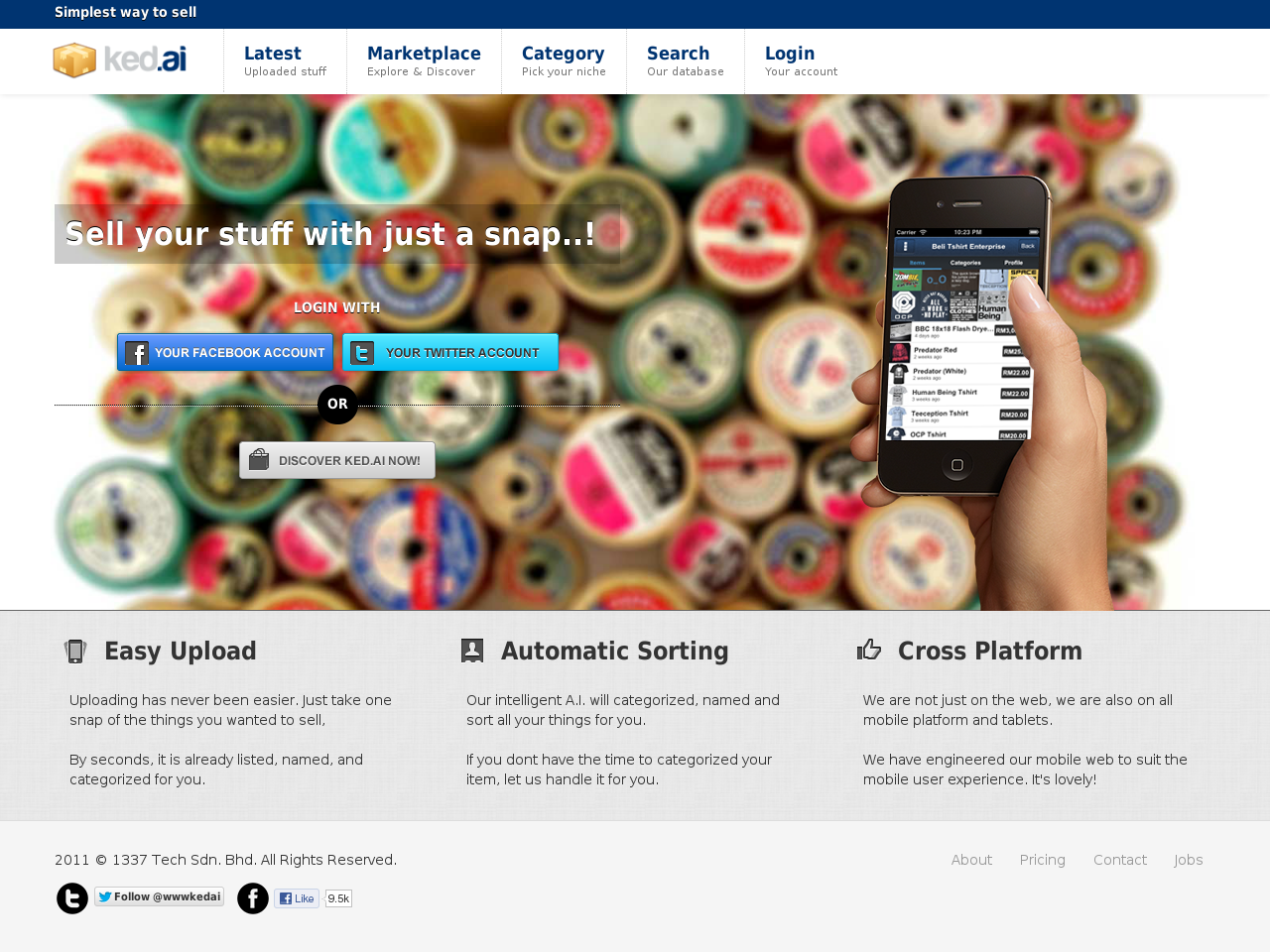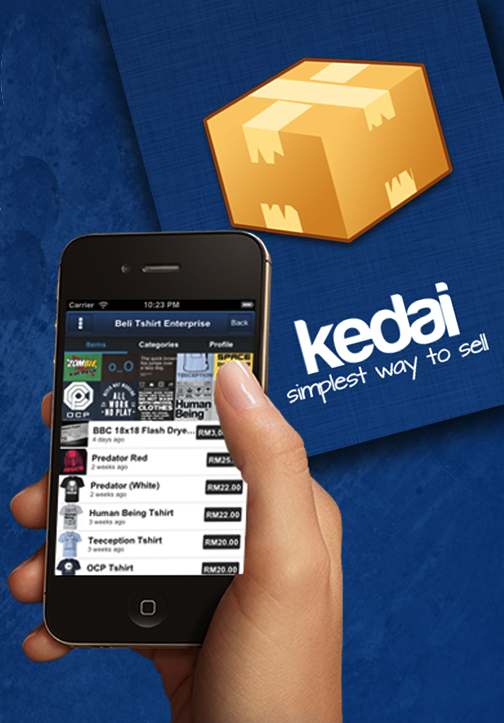Ked.ai offers e-commerce easy enough for mom
By Gabey Goh January 18, 2013
- Online marketplace Ked.ai wants to make selling goods online even easier
- Features object image recognition and predictive algorithms to automate the process of putting items on sale
 Arsyan Ismail’s (pic) mother wanted to sell her handbags online but didn’t know where to start.
Arsyan Ismail’s (pic) mother wanted to sell her handbags online but didn’t know where to start.
He told her to register on marketplace sites such as Mudah and Lelong and start putting her items out there.
“Immediately she said, ‘Malas lah nak register-register’ (Lazy to register). So I told her to just snap the photo of the handbags she wanted to sell, and let me do the submission for her,” he recalled in an interview with Digital News Asia.
As Arsyan was helping his mother fill in the blanks, it occurred to him that all she had to do was just snap the photo of the things she wanted to sell, and the rest could be automated.
From that realization, a new online marketplace called Ked.ai was born.
Of course, it helped that Arsyan happened to be founder and chief executive officer of startup 1337 Tech Sdn Bhd, established in August 2012, specializing in making “apps for quality living.”
Ked.ai (which translates to ‘shop’ in Malay) touts the tagline of “simplest way to sell” and is aimed at would-be sellers much like Arsyan’s mother, and anyone who wants to get started with selling goods online but lacks confidence in navigating the digital realm.
“Our clients are everyone; everyone has something to sell, and those are our clients,” said Arsyan.
“Hoarders are a case of nurture over nature. With Ked.ai, we are eliminating the hassle of letting go by way of selling. More than that, through our easy to use platform, even micro businesses stand to benefit,” he added.
Launched during the second half of 2012, Ked.ai’s flagship feature is its simplified method for uploading new items onto a seller’s online storefront.
As explained by Arsyan, photos of new items taken via the mobile app are processed and the system runs an object image recognition program to determine what is the name of the object. With that name, the platform then uses a predictive algorithm to determine which category this item belongs to so that it is sorted out correctly.
“It takes a simple single step and is the only process to begin selling. We are the first to do this in Malaysia,” claims Arsyan.
 Building the shop
Building the shop
The initial iteration of Ked.ai was a very basic prototype, with a template design and users limited to uploading one item at a time onto the marketplace.
“It was a prototype that we used to pitch to investors and customers. We also developed a basic application programming interface (API) for our mobile version of the app to work using JQuery Mobile,” said Arsyan.
The team managed to secure funding for the project, in the form of a joint venture with a pioneer government tech servicing company called Bytecraft Sdn Bhd.
“We are backed by Bytecraft but cannot disclose anything about our equity arrangement at this moment,” said Arsyan when asked.
With the injection of funds, the team got themselves some breathing room and went to work on fleshing out their initial prototype of Ked.ai, fine-tuning the User Experience (UX) and User Interface (UI) of the both website and mobile application.
“The current version of Ked.ai has more features such as multiple uploads. We also opted for a better framework and it’s being re-designed from the ground up. It is much better today compared to the prototype,” he said.
Ked.ai competes in the relatively mature space of online marketplaces and counts Mudah and Lelong amongst its competitors.
Arsyan noted there are also other e-commerce solutions that provide shopping cart services and other features, but none so far has incorporated the ability for users to just snap the photo of the things they want to sell – a key differentiator, he believes.
“You don’t have to do anything really after snapping the photos. You will have a shop with your items to sell and everything is named and categorized automatically. You update and put the price whenever you have time and you can do it while on the go, on your mobile phone,” he said.
When asked how the uptake of the platform has been since launch, Arsyan said the growth rate is “as expected without marketing at this moment," adding that he was unable to share any numbers with the public at this time.
He pointed to the platform’s Facebook fan page as an indicator of interest, which has 9,587 likes at time of writing. “We’ve peaked at 1,800 people talking about it and managed to hit a viral reach of about 22,000 people so far."

The next shop
The plan for Ked.ai in the next six months is two-fold. On the technical roadmap, the team is trying to source out the best payment gateway that any seller can enjoy without having to pay high transaction fee.
Arsyan shared that one potential partner would be MOL-Pay, especially with the launch of its new online payment solution MOLPay-FPX Plan targeted at new micro merchants and payments.
On the business side, the target for the first quarter of this year is to acquire more sellers to increase the platform’s offerings.
“We are approaching every single bazaar and flea markets to help these people to get their stuff sold online rather than just having a booth in events to generate sales,” said Arsyan.
The team is also planning to execute its marketing strategy soon to get word out to the masses about Ked.ai.
The toughest challenge, admited Arsyan, is trying to achieve critical mass in the market.
“Our Malaysian market is not big and strong enough to test and try out any new technology. Skepticism and doubt on local made products remain a challenge,” he said.
The 1337 Tech team believes that making the world simpler is the best way to experience life better. The team, which currently numbers five, holds domain expertise mainly in web technologies and apps development.
“We make apps that help consumers and business owners alike … . Together we try to make apps that have social value and commercial benefit to fund our goreng pisang (banana fritters) and teh tarik (pulled tea) sessions,” reads the mission statement on the company’s website
Arsyan himself has worked in many start-ups and telcos in Malaysia including Advertlets, Nuffnang, P1 Ruumz, MOL Friendster and YTL Communications before becoming an entrepreneur.
When asked how he keeps himself motivated, Arsyan shared that he reads a lot of tech news and gets inspired all the time with the wonders of technology. In addition, he brainstorms frequently with people, sharing his ideas and discussing them.
To would-be entrepreneurs, he has another source of motivation to share: “Always have that voice in your head telling you, that you need to return your investors’ money because it’s not your own.”
Related stories:
Newly launched MOLPay-FPX Plan aimed at micro-enterprises
Japan's GMO VenturePartners eyes SEA with US$12mil fund
Exabytes acquires Hinetmedia for e-commerce expansion
Are Malaysians ready for e-commerce?
For more technology news and the latest updates, follow @dnewsasia on Twitter or Like us on Facebook.


